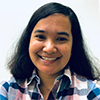Shalini Low-Nam

- Assistant Professor | Biochemistry
- Email: slownam@purdue.edu
- Phone:
- Office: 3130C BRWN
Areas of interest: Membrane biophysics; signal transduction; single molecule fluorescence imaging
The interactions between immune and cancer cells are of intense interest, given the potential to enhance anti-tumor responses using a patient’s immune system or engineered cells. However, a major hurdle to therapeutic developments is a lack of a mechanistic understanding of immune cell activation within the complex microenvironment of a tumor. Furthermore, the evolution of tumor cells under the mechanical regulation of the tumor microenvironment is poorly understood. A particular challenge is to measure signaling thresholds and decision-making at the single cell level; this is pertinent because the activities of one or a few cells may, in fact, dominate the population behavior. Understanding mechanisms of signal transduction in immune cells or cancer cells could create the actionable insights to improve targeting efforts and disease outcomes.
We recast the problem of signal integration using an analogy to signal processing; single cells detect inputs as discrete information that can be modulated in the frequency or amplitude domains (called ‘impulses’). The complex cellular machinery transforms these impulses using biochemical reactions into an outcome (called a ‘response’). Thus, the
impulse-response function
is a quantitative description of what a cell experienced and whether or not it responded. As already applied to T cell signal integration, the impulse-response assay revealed that single T cells measure binding event impulses based on their spatial and temporal features, in order to activate via the calcium signaling pathway (Lin, Low-Nam, et al, Groves,
Sci. Signal.
, 2019).
We are expanding impulse-response function measurements to determine how cells within the tumor microenvironment detect, parse, integrate, and respond to stimulatory and inhibitory signals. Projects fall into the broad areas of immune cell signaling and tumor cell signaling:
-Our work in immune cells is focused on the problem of macrophage polarization. As key mediators of innate immunity, macrophages are highly phagocytic and have the ability to engulf and eliminate diseased cells. However, within the tumor niche, macrophages receive signals that can reprogram their responses to generate pro-tumor outcomes. This change in macrophage polarization is an important problem whose underlying mechanisms remain unresolved. Since macrophages largely act as single cells, much like T cells, there is a need to resolve these signaling dynamics at the single cell level.
-In the area of tumor cell signaling, we are measuring the impulse-response function of cancer cells under environmental modulation. We are especially interested in responses that may tune immune cell function through modification of secreted factors, changes in surface expression of biomolecules, or changes that modulate physical interactions at the immune cell-tumor cell interface.
In order to address these challenging questions, we implement tools from chemistry, physics, biology and computer science. Methods from
in vitro
reconstitution, live cell imaging, single molecule fluorescence, image processing, biochemistry, molecular biology, cell biology, and immunology are needed to quantify signaling in living cells. We welcome diverse expertise on our team in order to tackle very challenging questions.
Lab themes:
-Direct visualization of signaling reactions
-Roles of space and time in live cell signaling dynamics
-The plasma membrane as a complex reaction environment
-Interdisciplinary tools and approaches to measure cellular dynamics
The long-term goal is to move the impulse-response function into the complex 3D environment of a tumor and to test the predictions from our measurements in the disease context.
Education
- B.S., The Johns Hopkins University, Cell and Molecular Biology; French, 2004
- Ph.D., University of New Mexico, Biomedical Sciences, 2011
- Postdoctoral Fellow (Hoppe Lab), South Dakota State University, 2014
- Postdoctoral Scholar (Groves Lab), University of California Berkeley, 2019